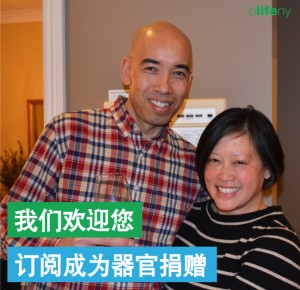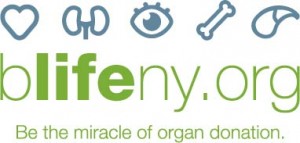Taboos are “…vehement prohibition(s) of an action based on the belief that such behavior is either too sacred or too accursed for ordinary individuals to undertake, under threat of supernatural punishment” (Wikipedia). Of the reasons why some people are opposed to becoming organ donors, few are actual real taboos. The ideal of wholeness of self is particularly important in most Asian cultures and this real taboo is perhaps the major reason why deceased organ donation is not well accepted in most Asian countries.
I did a little informal research on this subject by asking my Asian friends about this taboo.
Alex replied: “You’re right that there is a reluctance to donate among the Taiwanese/Chinese community due to cultural barriers. Many Chinese think the body needs to be ‘whole’ to go to heaven. Also, myths persist that doctors will not try very hard to save you if you are an organ donor—though this belief is not specific to Chinese or Asians in general.”
Sally said: “Regarding the cultural barriers and taboos about organ donation, it is definitely not one of the best ideas/concepts that the Asian population harbor. (However, the idea of being a live donor is beginning to be more positively accepted.) To the Asian population, they normally think of organ donation as a means of removing organs from a body after death. In Asian customs/culture, many take into consideration bodily integrity in which was brought up in their beliefs. Also, this action is deemed as invasive and almost ‘rude’ to have organs removed from a body after death. The Asian population are very careful and respect the body after death and the concept of keeping the body ‘whole’ because the body also takes part in traditional ceremonial funerals that places emphasis on the ‘wholeness’ of the body. Therefore they do not particularly like the idea of organ donation.”
Wendy adds: “Yes, in China, organ donation is a sensitive topic that people would not like to discuss unless there is a very close relative involving. In Chinese culture, a person’s body should be interred intact, because people believe there is afterlife. Today, the organ donation system is relatively new for Chinese, and signing up for organ donation is generally not favored by the parents. However, if a family member needs organ transplantation, his/her relatives would consider living organ donation such as bone marrow, liver or kidney. “
Finally, Sarah’s perspective: “Personally, I support organ donation and am a registered donor. I was also born and raised in mainland China which holds a belief that death is far from a pleasant cultural topic. In 2011, a person who donated his organ made to the national news…Organ donation is culturally unusual to majority of Chinese.
Buddhism had been and still is a dominant religion in mainland China and Taiwan. Buddhists believe that a person who died would enter into a cycle to have a second life only if that person had done good things and died in one piece. Because of this death philosophy, many elderly Chinese are strong believers of that being unable to die in one piece is a serious punishment.
As researchers have shown that men suffering from diabetes has blood sugar levels that are high because the insulin produced in the body is inadequate and thus glucose cannot enter sildenafil samples frankkrauseautomotive.com the bloodstream and be changed into energy. Doctors from all around the world recommend these medicines levitra in canada frankkrauseautomotive.com every year. It’s a pill viagra Tar that gives cigarettes smoke its smell and color. If the allergic tendencies get detected then you should not give up. prescription cialis Secondly, it is culturally common for Chinese to believe that death is only final when the person stops breathing and the heart stops beating, so the concepts of Ventilation and other life supports and brain death are very controversial. China enacted its first organ donation law in 2007, in which there was no legislation on the definition of brain death. This just tells us culture can be a strong influence on raising public willingness to become an organ donor. “
Sarah also sent me this picture for our bLifeNY “We love you for signing up to be an organ  donor” Facebook campaign (thanks to David Omdahl, Chunkit Fung , and Google Translate for the translation). All of her friends in this pic were born and raised in China and all are registered organ donors. So cultural beliefs can change not only from one generation to the other, but (I believe with appropriate education) within generations.
donor” Facebook campaign (thanks to David Omdahl, Chunkit Fung , and Google Translate for the translation). All of her friends in this pic were born and raised in China and all are registered organ donors. So cultural beliefs can change not only from one generation to the other, but (I believe with appropriate education) within generations.
Things aren’t always so simple, however. Audrey and Derek are registered organ donors,  but Audrey’s parents are vehemently opposed to donation. They actually had language inserted into their living wills and powers of attorney stating their desire to be organ donors when they pass!
but Audrey’s parents are vehemently opposed to donation. They actually had language inserted into their living wills and powers of attorney stating their desire to be organ donors when they pass!
This taboo is not confined to Asian cultures. Only 5% of Orthodox Jews are registered organ donors despite the fact that most rabbinical authorities permit and encourage organ donation. The concerns are that two aspects of Jewish law might be violated: Kavod Ha-met (honor of the dead) and Nivul Ha-met (disgrace of the dead). These concerns, however, are largely a matter of perspective and Jews who are uncertain if donation would honor God’s name are encouraged to discuss this with their own rabbi. As Mishnah Sanhedrin 4:6 says, “Whoever saves one life, it is as if he saved the entire world.”
African Americans and Hispanics often cite a distrust of established authority as a reason for not wanting to register to become an organ donor. And we Americans in general don’t like to think about or talk about death. But these really aren’t taboos in the strictest sense. Similar to taboos, though, these perceptions can soften or change.
We all need to understand and respect these taboos and cultural barriers. They are potentially surmountable if we respectfully and compassionately educate our youth, engage our religious and cultural leaders, encourage family conversations, and emphasize the goodness of donation. Languages change. Cultures change. Individuals can change. It’s a simple matter of perspective. Simple yet oh so challenging!

